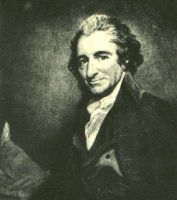
I must admit I had forgotten about it myself. Luckily I had programmed my planner to remind me about December 19, 1776. Do not worry if you have forgotten or never cared to remember this date. I don’t know where it ranks on the list of important dates, and frankly I don’t care.
I have to go back a few months when I was teaching an Early American history unit (regular U.S. History, not AP) and found myself struggling to convey to the students how unlikely and incredible the success of the Founding Generation truly was. It happened so long ago and seemed irrelevant to them, I suspect. But then it occurred to me that I had a document from that time period that could perhaps mean something if I found the right way to present it.
Thomas Paine’s “The American Crisis†captured the essence of the struggle, or perhaps better, the context of the struggle. Printed in the Pennsylvania Journal on December 19, 1776, it was written during Washington’s retreat across the Delaware. Washington was so moved by Paine’s words that he ordered them to be read to his “dispirited and suffering soldiers.†Later, as Washington moved on Trenton, just days after the publication of “The American Crisis,†Paine’s words again were no doubt on their minds and inspired them to an important victory.
Please allow me to share a few words from Paine’s “The American Crisis,†I offer it for reflection:
THESE are the times that try men’s souls. The summer soldier and the sunshine patriot will, in this crisis, shrink from the service of their country; but he that stands it now, deserves the love and thanks of man and woman. Tyranny, like hell, is not easily conquered; yet we have this consolation with us, that the harder the conflict, the more glorious the triumph. What we obtain too cheap, we esteem too lightly: it is dearness only that gives every thing its value. Heaven knows how to put a proper price upon its goods; and it would be strange indeed if so celestial an article as FREEDOM should not be highly rated…
…’Tis surprising to see how rapidly a panic will sometimes run through a country. All nations and ages have been subject to them: Britain has trembled like an ague at the report of a French fleet of flat bottomed boats; and in the fourteenth [fifteenth] century the whole English army, after ravaging the kingdom of France, was driven back like men petrified with fear; and this brave exploit was performed by a few broken forces collected and headed by a woman, Joan of Arc. Would that heaven might inspire some Jersey maid to spirit up her countrymen, and save her fair fellow sufferers from ravage and ravishment! Yet panics, in some cases, have their uses; they produce as much good as hurt. Their duration is always short; the mind soon grows through them, and acquires a firmer habit than before. But their peculiar advantage is, that they are the touchstones of sincerity and hypocrisy, and bring things and men to light, which might otherwise have lain forever undiscovered…